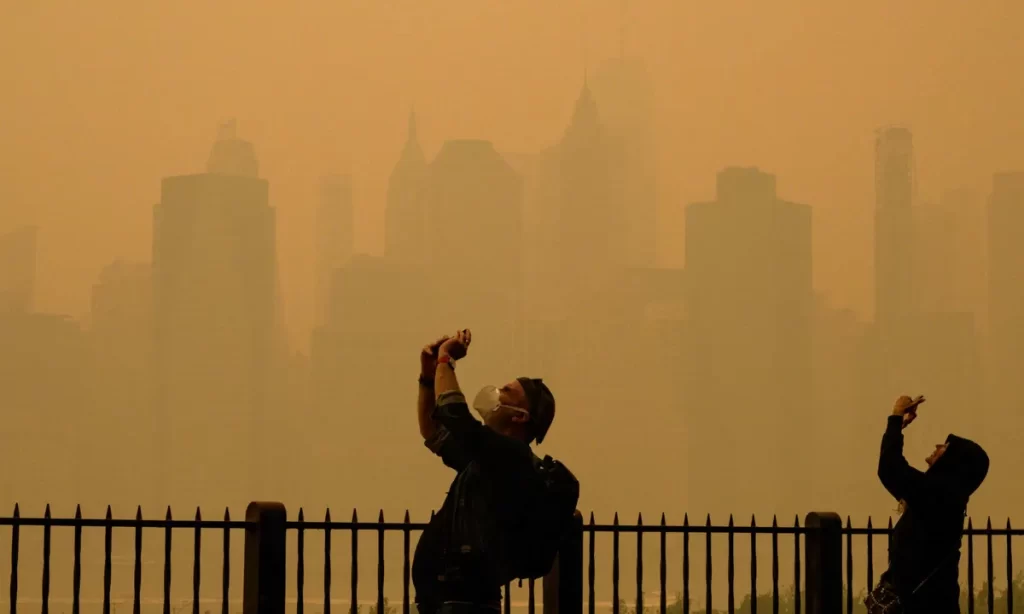Tens of millions of people in the US were under air quality alerts on Wednesday, as smoke from Canadian wildfires drifted south, turning the sky in some of the country’s biggest cities a murky brown and saturating the air with harmful pollution.
States across the east, including New York, Massachusetts and Connecticut, issued air quality alerts, with officials recommending that people limit outdoor activity.
In New York City, where conditions were expected to deteriorate further through the day, residents were urged to limit their time outdoors, as public schools canceled outdoor activities.
Smoke from wildfires in Canada has been moving south into the US since May. Hundreds of fires are burning in Canada, from the western provinces to Nova Scotia and Quebec in the east, where there are more than 150 active fires in a particularly fierce start to the summer season.
New York City had the worst air quality of any big city in the world on Wednesday, according to IQAir. Second worst was Lahore, Pakistan, while the next worst major US city, Detroit, Michigan, came in at 13th. Delhi, India, which consistently ranks among the worst cities for air pollution, was sixth worst.
The smell of smoke was detectable in New York on Tuesday evening as the sky turned orange-brown and visibility shrank before sunset. The smell persisted on Wednesday, and an air quality advisory was expected to remain in place until Wednesday night in much of central and eastern New York state. In New York City, schools canceled all outdoor events and residents were encouraged to wear face masks, which many had shed as the coronavirus pandemic waned.
“We recommend all New Yorkers limit outdoor activity to the greatest extent possible,” the mayor, Eric Adams, said.
“Those with pre-existing respiratory problems, like heart or breathing problems, as well as children and older adults, may be especially sensitive and should stay indoors at this time.”
Adams said air conditions were expected to deteriorate throughout Wednesday afternoon and evening.
Almost the entire state of New Jersey was under an air quality alert, while hazy conditions and smoke from the wildfires were reported across the Great Lakes region from Cleveland, Ohio, to Buffalo, New York.
The smoke had drifted as far south as South Carolina, where officials recommended that people keep doors and windows closed.
In Philadelphia, the smell of smoke prompted a spate of 911 calls on Tuesday night, 6ABC reported, as residents were asked to avoid going outdoors as much as possible.
Air-quality alerts are triggered by a number of factors, including the detection of fine-particle pollution – known as “PM 2.5” – which can irritate the lungs.
“We have defenses in our upper airway to trap larger particles and prevent them from getting down into the lungs. These are sort of the right size to get past those defenses,” Dr David Hill, a pulmonologist in Waterbury, Connecticut, and a member of the American Lung Association’s national board of directors, told the Associated Press.
“When those particles get down into the respiratory space, they cause the body to have an inflammatory reaction to them.”
The US Environmental Protection Agency (EPA) said hazy skies, reduced visibility and the odor of burning wood are likely, and that the smoke will linger for a few days in northern states.
“It’s not unusual for us to get fire smoke in our area. It’s very typical in terms of north-west Canada,” Darren Austin, a meteorologist and senior air quality specialist with the Rhode Island department of environmental management, told the AP. But, usually, the smoke has been aloft and hasn’t affected people’s health, Austin said.
Experts, and some political leaders were highlighting links between the wildfires and the climate crisis.
A 2021 study supported by the National Oceanic and Atmospheric Association found that climate change has been the main driver of the increase in hot, dry fire weather in the western US.
By 2090, global wildfires are expected to increase in intensity by up to 57% thanks to climate change, a United Nations report warned last year.
Source: The Guardian


